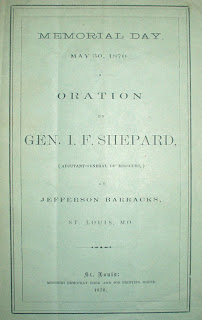Memorial Day began after the American Civil War as a commemoration to honor fallen Union and Confederate soldiers. In 1868, General John A. Logan, commander-in-chief of the Grand Army of the Republic, issued a proclamation to observe it nationwide on the last Monday in May.
In the Book Division of the Clements Library, a Memorial Day oration by General I.F. Shepard from 1870 provides an example of the type of commemorative speech often delivered on this national holiday. General Shepard reflected on the recent Civil War and soldiers’ sacrifices for the nation, providing a narrative of nobility and ultimate victory that gave meaning to the painful memories of his listeners. He closed with a poem, “Memorial Day” by Judge R.E. Rombauer. Excerpts from the text below:
Opening:
“Ladies and Gentlemen, Fellow-Citizens and Surviving Comrades: Another year has brought us to these consecrated grounds, again to pay our tributes of love and reverence to departed heroes who sleep peacefully about us beneath these mounds and monuments.
. . .
It is fitting, then, that we make our annual pilgrimage to their graves to recall the teachings of the grand drama, to rehearse their deeds and their virtues, and to embalm their memories with all the tender rites of affection and of honor.”
Conclusion:
“Spirits of the noble dead! Ethereal host of undying heroes! Bend above us in fraternal greetings, and accept our tokens of love! Help us to bear our part in all duties, till, once again united, we stand in serried ranks of most glorious victory, where flowers spring eternal beside the still waters of life in the better land!”
Poem:
Memorial Day
By Judge R.E. RombauerWhen freedom once from East to West,
Sent forth her battle-cry,
Nine hundred thousand warriors rose,
To conquer or to die.Nine hundred thousand warriors armed,
And marched to martial strains;
But ah! full many thousand went
That never came again.On Souther plains–on Southern hills–
In brake and mountain dell,
They fought that freedom still might live–
That she might live, they fell.And when her bright day dawned again–
Dawned after years of dread–
A thankful nation mournful went
To seek its hero dead!It sought for them, in places all
Swept by the battle tide;
It built for them a garden home,
And laid them side by side.* * * * * * * *
And years of war brought years of peace;
Then came another day;
When, after winter storms and frowns,
The roses blushed in May.And lo! men, women, children come
From places near and far–
An army grand, yet unadorned
By panoplies of war.They come adorned with flowery wreaths
Through the quiet shades to roam.
Where their brave brothers sleeping lie,
In their still garden home.To deck their couch with fragrant leaves,
To pray with fervent mien
Their fame might be forever bright,
Their memory ever green.* * * * * * * *
Oh! brothers all! and sisters all,
Of every race and age;
Who from all places near and far
Join in this pilgrimage;Whose steps by powers of love are led
And guided all above,
Let us forget the days of hate
On this great day of love.Let us forget the slaying hand,
Forgive the erring will;
Thanks to our fallen brothers brave,
We are one nation still.

